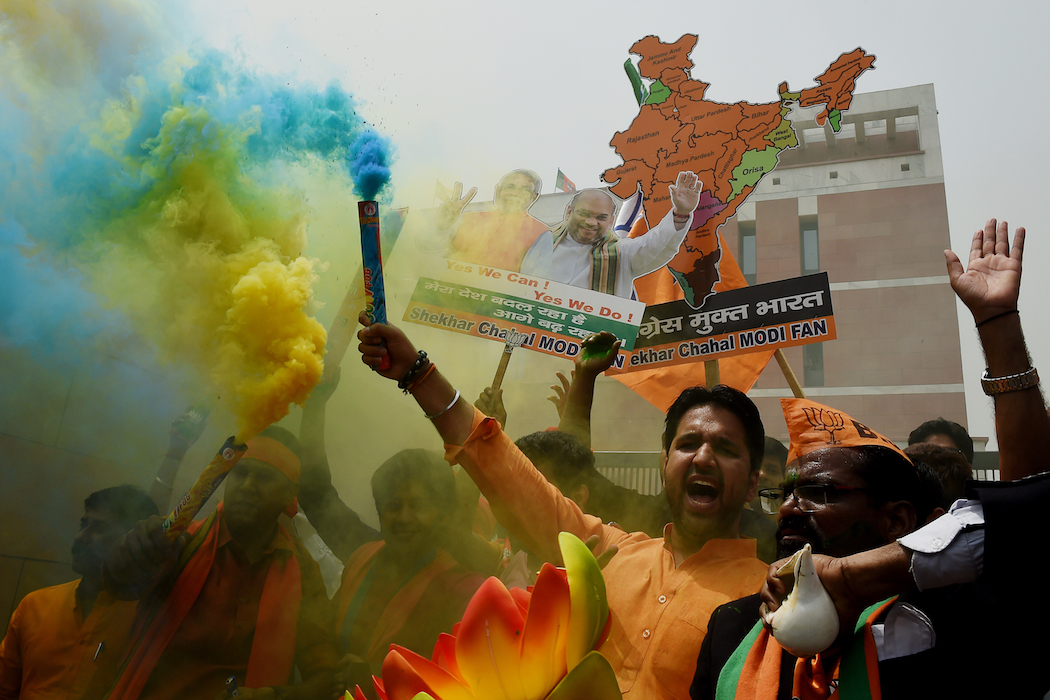All religious traditions seem to favor compliance and stability over enquiry and dissent

Supporters of India’s Bharatiya Janata Party (BJP) celebrate election results outside the party headquarters in New Delhi on May 15. (Photo by Money Sharma/AFP)
June 6, 2018
“The 21st century will be religious, or it will not be at all,” said the French writer Andre Malraux.
For many of us, weary of the atheist ideologies of fascism and communism, which wrought untold suffering upon millions during the last century, the return to a public religious awareness was greeted with a sigh of relief.
But this was short-lived. The death of ideology was followed by the return of religious fundamentalism — the rigid grip of medieval religious beliefs upon every aspect of life, a rigidity moreover shared by almost every religious tradition.
So why religious fundamentalism, and what explains its hold upon so many of our contemporaries?
Let me begin by stating firstly that fundamentalism is not exclusively religious — it can be economic or political as well. Basically, it is the tendency among certain groups to apply a strict literalism to specific scriptures, dogmas, or ideologies.
There’s also a strong sense of the importance of maintaining in-group and out-group distinctions (“you belong to us — they don’t!”). This in turn leads to an emphasis on purity, and the desire to return to a previous ideal from which it is believed members have strayed. No criticism is tolerated when applied to these “fundamentals” and their interpretation. Fundamentalism is unforgiving of any dissent whatsoever.
So let’s situate fundamentalism in its historical setting.
The last quarter of the 20th century has been marked by two major phenomena, among others. They are firstly, mass migration; and secondly, technological domination. Both these phenomena create fear and apprehension in most societies, as they upset the stability upon which most societies are built.
Mass migration, first. There are three kinds of mass movements which cut across frontiers and overwhelm local populations. They are firstly, tourism; then the migration of those seeking better employment; and finally, people fleeing persecution and violence: refugees. All three movements cause displacement of peoples, and bring serious problems both to individuals and to society.
But mass movements of people are not the only instruments of change. We live in a world dominated by technology — mostly media and information technology — which dictate every aspect of our lives. More and more, what we eat and drink, the friends we converse with, our secret worlds of imagination and feeling are all “mediated” — that is, they are modified, processed and ‘re-presented’ by technology.
For the young, media technology is exhilarating: duniya mutthi mein (“the world within one’s grasp”). But older people, the poor and the illiterate find themselves precluded and displaced by technology’s hectic pace. They fear being made irrelevant.
In an older world, whether in the East or West, people grew up in a unity of faith and politics. Put more simply, what you and your family believed in was shared by the whole clan and city-state. If there were others who configured their beliefs differently, they were marginalized and sequestered. They were a ‘minority’. Usually, they were never given equal rights. For “error has no rights”, only concessions — if the majority were generous. When the majority was not so inclined, the persecutions and the pogroms began.
This was the medieval world in which all religious societies lived — Christian, Jewish, Islamic, Hindu, Buddhist. Incidentally, this was also the Catholic world before Vatican II. But it is not the modern world of secular democratic ideals, the world of “liberty, equality and community” of societies which grant human rights to all.
A friend of mine expressed it thus: all democracies rule in tension. The tensions lie between wanting a society where every right must be negotiated and fought for, where religious values are constantly re-interpreted, and where one perforce must live next to groups with different cultural aspirations. Yes, democracy is cacophony.
Between all of the above — and a society which blindly believes in the “fundamentals:” one people, one nation, one leader, one faith, one uniform civil code, one language, one common destiny for all — is the choice facing our peoples today. For thus does politics shrewdly use faith to promote simple-minded beliefs.
“Those made to believe absurdities,” observed Voltaire, “can equally be led to commit atrocities.”
And as we as a nation regress more and more into the feudalism of the past, and as the few elements of modernity increasingly collapse before religious and communal revivalism, and as fundamentalism asserts its control over public behavior, we may possibly look upon those distant decades, the 1950s and 60s, as our all too brief ‘tryst with destiny.’
Yes, it was a tryst with liberty, democracy, and inclusivity, once brokered by Nehru, Gandhi, Ambedkar, Azad, Bose and their generation, but sadly sabotaged by those who came after.
For democracy is not a matter of winning elections. That’s the easy part. Democracy is related to the uplift and dignity of each individual and social group in this huge country. It is connected to the right to question and dissent — the very opposite of fundamentalism.
And God knows, we are far, far from being an example of a democratic nation to the rest of the world!
Father Myron Pereira SJ is a media consultant based in Mumbai.
